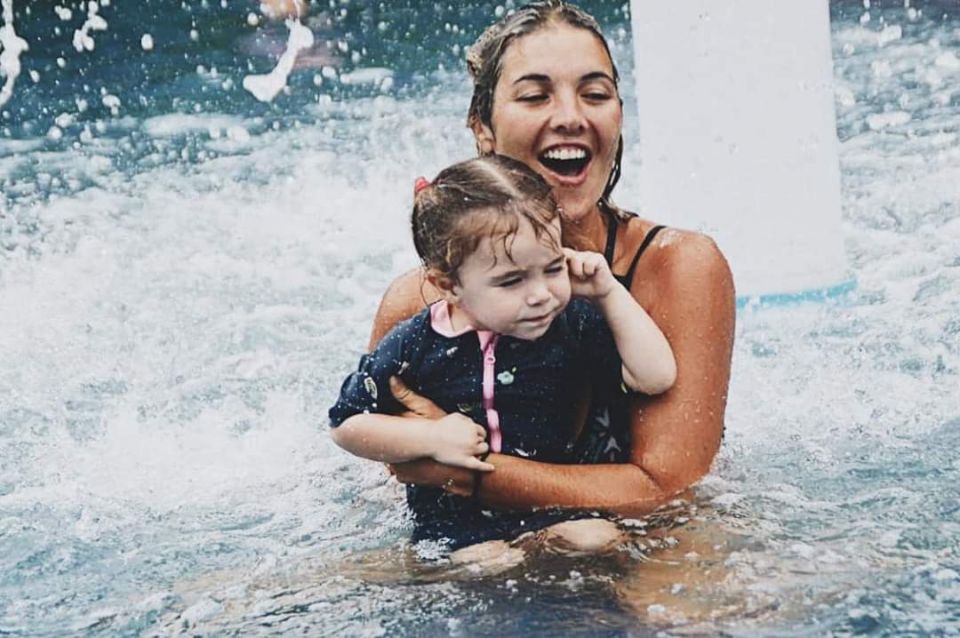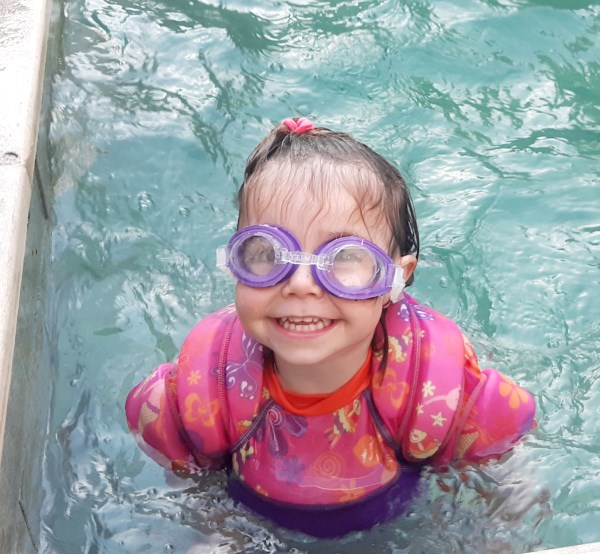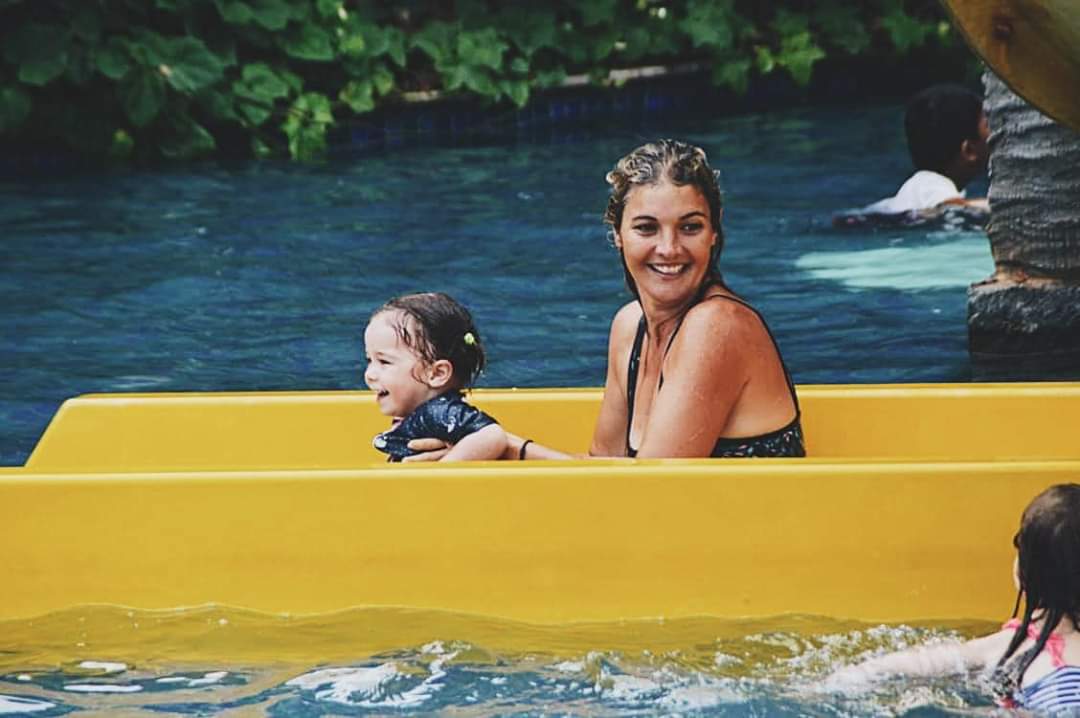3 Reasons Why Your Child Will Not Swim With You & 6 Things that You Can Do to Help Them
12/27/2019 | Written by Abbey McKenna in Kids
My youngest daughter refused to leave my side in the pool. She did not want to blow bubbles or put her head under the water. I was once a qualified swimming teacher and I tried everything in the book to get her happily swimming like her older sister. Straws, games, songs, you name it, but unlike my students, Indi was not going to give anything a go with me.
It was not that Indi was scared of the water. We had been in and out of pools and the ocean together from the time she was little. She loved just hanging out in the water with me, as long as she was hugging me. It was engaging in the basic swimming skills that seemed to cause her stress.
I put a great effort to kickstart her swimming prowess, but it wasn’t happening. Was it that she did not feel safe with me? Was I not the great teacher that I thought I was? Was my daughter is going to be the first student that I did not have any success with? I started to doubt myself. I begrudgingly signed her up for swimming lessons.
During the times when Indiana needed to be supported by an adult, she would cling to me and not join in during the lesson. If I asked a friend or relative to accompany her, she would become a fearless mermaid. It was simply swimming with mum that she had an issue with.
She would giggle and jump at the opportunity to join in and swim about with the teacher. She would gladly blow bubbles and dunk her head in the water as if she was a dolphin in her past life. She would go to great lengths to be the first one to try new things. She didn’t even hesitate at the jumping activities. As long as I was nowhere to be seen.
Why Will My Child Not Swim With Me?
There are many reasons that children may cling to parents during swimming lessons. It is important to remember that there is nothing wrong with your child, and they are not being a nuisance or naughty.

1. Fear of Water
Your child may, in fact, be genuinely scared of the water. After all, it looks different, feels different, their bodies behave differently in water, and there are lots of different sights and sounds at a pool or the ocean.
It may be that your child did not present these fears until being a toddler, and it almost seems as though they have regressed. New fears will often come about when a child is 18 months old. Some parents will feel annoyed, or worried about this. But rest assured, it is quite normal.
It is very important to be sensitive to what they are feeling and support them. They need to know that you understand how they are feeling, and they need you to be patient to feel safe. Be aware of using positive body language. Getting annoyed, huffing and puffing or saying things like “what is the problem, you are not scared, you weren’t scared before”, will only work against you and your child at this point.
If they are old enough, talk to them and find out why they are scared. They may have had an experience, heard or seen something. Once you know, you can then find the words and strategies to help them past it.
My daughter once got soap in her eye and it took her a long time to want to put her face anywhere near any water, including the bath and shower. We gently explained that there was no soap in the pool and demonstrated by putting our own heads under the water and coming out happy. She was happy to give it a go again after this.
2. Safe Zone
Mum, Dad, and other significant adults are a child’s home base. They are their safe zone. It has been proven by science, that children act and behave differently for other people than they do with their parents. I almost guarantee that you have experienced this yourself.
Children will often go along with what other people ask them to do, but if you, their parents ask them, it is a whole different story.
Once again, this is not your child being naughty, you are the person that makes them feel comfortable. If your child is not willing to let go of you and swim but is happy to do so for other people, be proud. Give yourself a parenting sticker. It may just be that your child feels safe around you.
3. Attention
Our children CRAVE our attention. They will do anything within their power to get it. This may mean refusing to swim for you. This is okay too.
I found with my daughter that she needed less attention from a swimming teacher than she did from me, so she was more willing to try things and learn with them because she wasn’t focused on getting their attention.
6 Things That You Can Do if Your Child Will Not Swim With You
It is okay if your child does not want to practice their swimming skills with you, but is happy to do it for other people. As we discussed earlier, it is natural and a good indication that your child feels safe around you (gold star for great parenting!).
You will still want your child to be a competent swimmer, so what can you do to encourage this?

1. Be calm and be nurturing. Do not push them.
Your child must have as many positive experiences of the water as possible. In the times that your child does not want to swim with you, be calm and okay. Do not try and force them, just support and love them through these moments.
Use positive language and ensure that they feel safe at all times.
Do not push them to swim or try new things, let them know it is okay to be scared and gently support and encourage them. It will happen in their own time. Sometimes they just need to watch other kids for them to get the confidence to have a go, sometimes it takes time.
2. Be okay with your child being happy to swim with the teacher
At the end of the day, the most important thing is that your child enjoys swimming, can keep themselves safe, and has a level of skills to survive around water. It does not matter if they learn these vital skills with you or with someone else. The point of the matter is that they are safe and happy.
You are not failing if you employ a swim school or a swimming teacher to help your little one along the way. As parents, it is okay to do things that make learning or our day to day life more pleasant.
Just like accountants are trained to handle your money, swimming teachers are qualified to teach your children to swim. You can feel confident in the knowledge that you made a decision that will result in improving your child’s safety. They will also get to meet new friends along the way and have a whole heap of fun.

3. Enrol your child with a swimming teacher or in swimming lessons
Swim teachers and swim schools are professional people and institutions, with the skills to help to develop your child’s swimming skills and professional ability to take care of your child.
Swim teachers are taught to nurture a child and help them with their confidence as well as foster swimming skills. Just like schoolteachers, swimming teachers are equipped with expertise and tools to foster your child’s learning and abilities, and meet them at their level.
Children will often respond better with other people as they are interested in the activity rather than being focused on you as their parent, gaining attention, or being distracted by their safe person being near.
Infant and toddler swim schools will most likely require you to be in the water with your little one, so you can still be their safety net. However, you will have a professional helping to make them feel calm and learn important skills. It is less stressful for parents and children, and you can use this time to bond and enjoy being with them and leave the skills development up to the experts.
4. Choose lesson times that suit your child's routine
Learn from my mistake. If your child’s usual nap time is at 10:30, it makes no sense to expect them to do well at a 10:45 swimming lesson. Little people just do not function well physically or emotionally when they are tired.
I had Indi booked into her swimming lessons at a time that coincided with her usual morning nap and it was not good at all. On most days, she was falling asleep halfway through the lesson and wasn’t getting much out of it at all.
If we did make it through the lesson, then she was very cranky when we got out and getting her ready to leave the swimming complex was like trying to shower and dress a banshee. I would literally put her in the shower with a punnet of blueberries to try and bribe her.
As adults, we don’t learn and function well when we are not well-rested. Little people are no different. So be mindful of the times you book in for swimming lessons where possible.
5. Talk to the Swimming Teacher and take into account the big picture
Let your swimming teacher know everything that you can about your child’s swimming and water experience, as well as other things that might play a part in their feelings about the water.
- How confident is your child in the water?
- Have they had any positive or negative water experiences?
- How long have they been swimming or around water?
- Are they feeling well?
- Is anything happening that may be affecting them (e.g. tiredness, family situations)
Letting your swimming teacher know the full perspective will help them to best support a child and make plans specifically for them, their ability on that day, and their confidence levels.
For example, letting them know that dad has flown out to work and the child is missing them may mean that the teacher takes a different approach. The teacher may ask that you stay close to the child and let them cling to you because it is what is best for them emotionally on that day.
At the end of the day, you want swimming to be a positive experience for your child.
6. Attention through positive reinforcement
Remember earlier in this article, we discussed that your child may simply be wanting attention from you and this may be a part of the reason why they refuse to take part in swimming with you?
You can use this to your advantage by giving them a whole heap of attention and positive reinforcement when they do attempt anything that remotely resembles swimming.
They will soon learn that giving it a go results in you celebrating with them. Do not shun or shame them when they do not, but go a little overboard when they do. If your child is a little introverted and gets embarrassed when you get loud (like Indi), give them a quiet and personal high five and some intimate words of encouragement.

A Final Note: Every Child is Different
Funnily enough, I am writing this article while watching my kids happily playing in the pool. Indi is still learning basic swimming skills and my eldest daughter is very competent. When I join them in the pool, they are not only exciting for me to join them, they are very happy to show me the new skills they are practising.
My eldest daughter found swimming easy and she was much more comfortable, much quicker than my youngest. She was also swimming independently much earlier on.
Remember that every child is different. You may have one that takes to swimming as naturally as they progressed from clutching at furniture to walking. You may have another child who is a little timider and needs a little bit of extra help and encouragement.